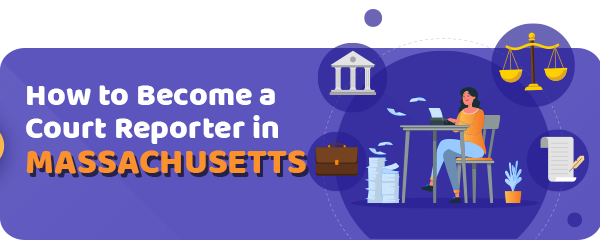A court reporter, alternatively known as a court stenographer, real-time writer, or certified shorthand reporter (CSR), plays a crucial role in transcribing spoken words during legal proceedings such as trials.
This role renders the court reporter a substantial contributor to the functioning of the justice system.
Individuals aspiring to become court reporters in Massachusetts must adhere to specific licensure requirements.
This article provides a comprehensive guide to the necessary steps for obtaining licensure.
Article Table of Contents
Complete Your Education as a Court Reporter in Massachusetts
The journey to becoming a licensed court reporter necessitates the completion of an accredited training program.
This program’s approval is sanctioned by the Massachusetts Board of Court Reporting.
Prospective students must fulfill the following criteria for enrollment:
- Being at least 18 years of age
- Successful completion of high school education or equivalent (GED)
These accredited training programs encompass specialized areas such as:
- CART/Captioning
- Judicial Reporting
- Scoping/Proofreading
- Professional Transcription
- Office Assistant
- Court and Realtime Reporting
Prospective students must ensure that the curriculum aligns with the guidelines established by the Council on Approved Student Education (CASE).
Key subjects covered in these programs include:
- Applied Writing I
- Medical Terminology
- Legal Terminology
- Civil and Criminal Law Terminology
- Realtime Reporting I
- Realtime Reporting II
Typically offered at the postsecondary non-degree level, these programs offer various credentials, including certificates, diplomas, associate’s degrees, and bachelor’s degrees.
Consider the following institutions for court reporting training in Massachusetts.
Boston University 
Boston University offers a comprehensive course covering court reporting, closed captioning, and CART services.
This online course accommodates flexible, self-paced learning. No strict enrollment requirements are stipulated.
The course aims to enable students to write at speeds of up to 225 words per minute.
The program costs $6,104 for individuals who do not require a steno machine, while those needing the machine must pay $7,899.
Students gain access to the CAT program during enrollment, with the option to purchase it for future professional use.
University of Massachusetts Amherst 
The college offers an Associate in Applied Science degree in Court Reporting Technology for individuals aspiring to become court reporters.
Enrollment occurs exclusively during the fall semester, and successful completion of the program mandates at least a “C” grade in all Court Reporting courses.
The National Court Reporters Association (NCRA) Council also requires this grade in certain subjects.
Candidates must also achieve a minimum accuracy rate of 96% in four 5-minute tests, covering topics such as:
- Two-voice testimony at 225 words per minute
- Jury charge at 200 words per minute
- Literary passage at 180 words per minute
An internship of 50 hours is a mandatory component, with 40 hours focused on writing practice.
| School Name | Address |
|---|---|
| Boston University | Boston, MA 02215 |
| University of Massachusetts Amherst | Amherst, MA 01003 |
Obtain Licensure as a Court Reporter in Massachusetts
Upon completing education, candidates must successfully pass an examination to acquire a court reporter license.
This exam must be completed within 18 months of completing the training program.
A temporary license can be obtained during this period, although it cannot be renewed.
Aspiring court reporters can earn the following nationally recognized certifications:
- National Court Reporters Association’s (NCRA) Registered Professional Reporter (RPR) certification
- National Verbatim Reporters Association’s (NVRA) Certified Verbatim Reporter (CVR) certification
In addition, candidates must pass a skills exam specific to Massachusetts licensure through one of the following organizations:
- NCRA,
- NVRA,
- ACRA.
The process entails:
- Payment of requisite fees: $200 for the license and $50 for the application
- Presentation of proof of program completion
- Submission of the application form
The ACRA test closely resembles the NCRA and NVRA exams. While the NCRA skills test is available online, the other two exams require in-person participation.
For those pursuing the Registered Professional Reporter certification, the fees are as follows:
- Non-member: $120
- Member: $95
- Student member: $77
The NVRA exam fee is $125. Candidates aspiring to become certified verbatim reporters can transfer for a fee of $50, provided they hold a registered professional reporter certification.
The Certified Court Reporter (CCR) skills exam costs $75 and comprises three 5-minute sections, each requiring transcription to meet specific word counts:
- Literary at 180 words per minute
- Jury charge at 200 words per minute
- Testimony/Q&A at 225 words per minute
Candidates have 75 minutes for transcription, with a minimum passing score of 95% accuracy in Massachusetts.
A knowledge-based written exam for the Registered Professional Reporter certification includes 120 questions covering technology, professional practices, ethics, and reporting practices.
The minimum passing score is 70, with fees varying:
- Non-member: $220
- Member: $195
- Student member: $160
The NVRA exam costs $125.
Court Reporter License Renewal in Massachusetts
Similar to other professional licenses, court reporters must periodically renew their licensure.
The renewal process entails specific fees:
- On-time renewal: $200
- Renewal until September 31st: $240
- Renewal by November 30th: $280
To complete the license renewal procedure, individuals must engage in 5 hours of continuing education annually.
These hours can be carried over to the subsequent year.
Continuing education credits must be earned through approved organizations like NCRA, NVRA, and ACRA, while personal development courses are generally not accepted.
Court Reporter Salary in Massachusetts
For those intrigued by the court reporter profession and its earnings potential, the median annual salary for court reporters in Massachusetts is $67,280.
The table below highlights cities within the state with the highest median salaries in this occupation.
Annual Salary Range:| Location | Avg. Annual Salary |
|---|---|
| Arlington | $69,654 |
| Weston | $69,654 |
| Cambridge | $69,654 |
| Boston | $69,654 |
| Brockton | $67,509 |
| Methuen | $66,025 |
| New Bedford | $65,778 |
| Fall River | $65,778 |
| Worcester | $65,240 |
| Springfield | $64,588 |
Regional Salary in Massachusetts
| Region | Employed | Avg. Annual Salary | Avg. Hourly Pay | Top 10% Annual Salary | Bottom 10% Annual Salary |
|---|---|---|---|---|---|
| Boston-Cambridge-Newton, MA-NH | 40 | $71,180 | $34.22 | $83,650 | $43,550 |
* Employment conditions in your area may vary.
Frequently Asked Questions
What skills do I need to become a court reporter in Massachusetts?
Here are some of the main skills and abilities of a court reporter, regardless of state:
- Good hearing
- Able to sit for long periods
- Word knowledge
- English / grammar skills
- Good use of both hands
- Able to handle stress
- Good organizational skills
Which courts hire court reporters in Massachusetts?
All of the state’s courts hire court reporters.
Here are some examples:
- Appellate Courts
- Superior Court
- District Courts
What other requirements are there to become a court reporter in Massachusetts?
Candidates for licensure must ensure they:
- Are an American citizen
- Have a photo not older than 6 months
Read the full guide: How to Become a Court Reporter (Stenographer)



I agree with renewing the license, you have to continue educating yourself and stay updated with advancements in court reporting technology. A lot of court reporters pursue additional certifications and specializations to expand their career options.
I’ve been planning to go to Boston University, they seem like they have a great training program there even though it is a bit pricey but I think it is worth it. Thanks for this!